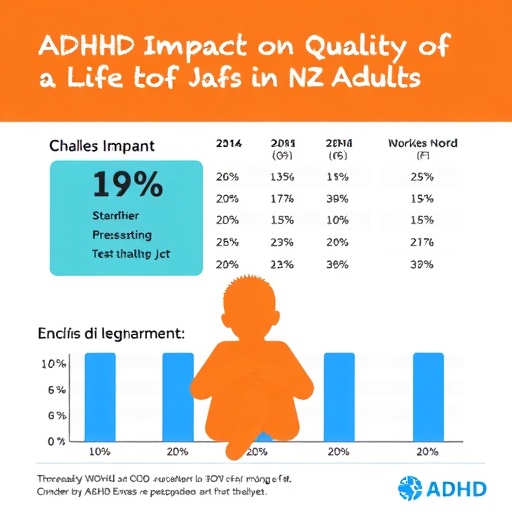A recent investigative study conducted by A.J. Murray sheds light on the quality of life differences experienced by adults in New Zealand who suspect they may have Attention-Deficit/Hyperactivity Disorder (ADHD) compared to those who have been diagnosed with the condition. This research highlights the often-overlooked nuances of mental health, inviting contemporary discussions around ADHD’s implications on personal well-being and social integration.
Attention-Deficit/Hyperactivity Disorder is a neurodevelopmental condition that significantly influences a person’s life trajectory. A common misconception is that ADHD only affects children; however, symptoms often persist into adulthood, adding layers of complexity to various aspects of life. Adults with suspected ADHD may face unique challenges that diverge from those encountered by individuals with a formal diagnosis, making Murray’s study timely and crucial.
In his study, Murray gathered data from a diverse sample of New Zealand adults, focusing on their self-reported quality of life. Participants were categorized into two groups: those who suspected they had ADHD and those who had received a formal diagnosis. This distinction allowed for an in-depth analysis of how recognizing or not recognizing ADHD can influence one’s perception of their quality of life and overall mental health.
The findings revealed notable differences between the two groups. Individuals diagnosed with ADHD reported experiencing varying degrees of effectiveness in managing their symptoms. These management strategies included medication, therapy, and lifestyle changes, which played a pivotal role in enhancing their quality of life. In contrast, those only suspecting they had ADHD often neglected or did not seek help, which significantly impacted their daily functioning and life satisfaction.
Furthermore, the study delved into the perception of social stigma associated with ADHD diagnoses, which can deter individuals from seeking the help they need. Many adults harbor misconceptions about ADHD that lead to internalized stigma, causing them to feel reluctant to pursue evaluation and treatment. Murray emphasizes that this stigma can exacerbate mental health challenges, creating a cyclical pattern of diminished quality of life.
The role of self-awareness and diagnosis cannot be overstated. Those who suspected they had ADHD often exhibited cognitive and emotional symptoms similar to their diagnosed counterparts. However, the critical difference lies in their ability or inability to seek appropriate interventions and the support systems available to them. This highlights the essential pathways through which healthcare can improve the lives of those grappling with ADHD.
Murray found that participants with a formal ADHD diagnosis reported better adaptability in their social and professional environments. They were more likely to engage in proactive behaviors, such as seeking help from mental health professionals and building support networks. On the other hand, individuals who self-identified without a diagnosis tended to experience heightened anxiety and frustration, stemming from their inability to understand their symptoms or how to manage them effectively.
The socioeconomic factors also played a significant role in the quality of life of these adults. Being diagnosed often provided individuals with access to resources such as therapy, educational support, and medication, which helped mitigate the challenges they faced. This disparity raises essential questions about access to mental health resources and the importance of creating supportive environments for individuals suspected of having ADHD.
Mental health advocacy and awareness campaigns can potentially alter the landscape for those navigating ADHD. By addressing stigma and increasing mental health literacy among the general population, society could foster a more inclusive environment where individuals feel empowered to seek help. Education can dismantle misconceptions and contribute to a broader understanding of ADHD as a legitimate condition warranting professional intervention.
Murray’s study is significant for its implications in shaping future ADHD research and policy. The distinct experiences of suspected and diagnosed individuals underscore the urgent need for mental health services to tailor their approaches to address these nuances. By recognizing the differences in quality of life between these groups, policymakers can create frameworks that enhance accessibility to support and treatment for all adults, regardless of their diagnostic status.
Ultimately, this investigative study by Murray reveals the complex interplay between self-awareness, diagnosis, and quality of life in the context of ADHD. As more research emerges, it becomes increasingly clear that addressing ADHD’s implications is vital for improving mental health strategies within various populations. Insights from this study can inform not just future academic research, but also community outreach programs focused on mental wellness.
In summary, Murray’s exploration of the quality of life differences between suspected and diagnosed ADHD adults opens a crucial dialogue on mental health awareness. Encouraging further understanding of these differences is essential in creating a society where all individuals, with or without a diagnosis, can thrive. This research is a stepping stone towards destigmatizing ADHD, promoting treatment access, and improving overall mental health care.
Subject of Research: Quality of life differences in adults with suspected and diagnosed ADHD
Article Title: Suspected and diagnosed ADHD quality of life differences: an investigative study of New Zealand adults
Article References:
Murray, A.J. Suspected and diagnosed ADHD quality of life differences: an investigative study of New Zealand adults.
Discov Psychol 5, 149 (2025). https://doi.org/10.1007/s44202-025-00493-7
Image Credits: AI Generated
DOI: https://doi.org/10.1007/s44202-025-00493-7
Keywords: ADHD, quality of life, mental health, diagnosis, stigma, treatment, neurodevelopmental disorders, New Zealand.




